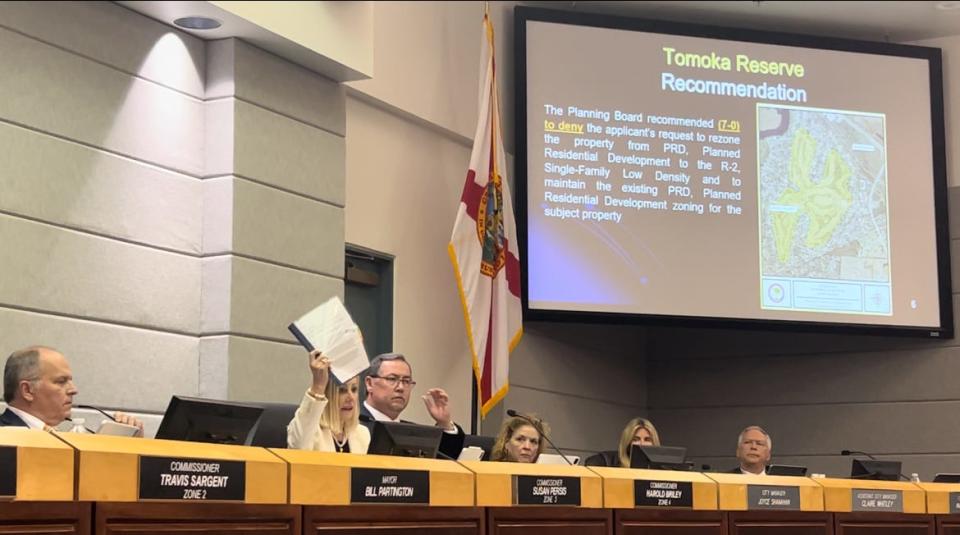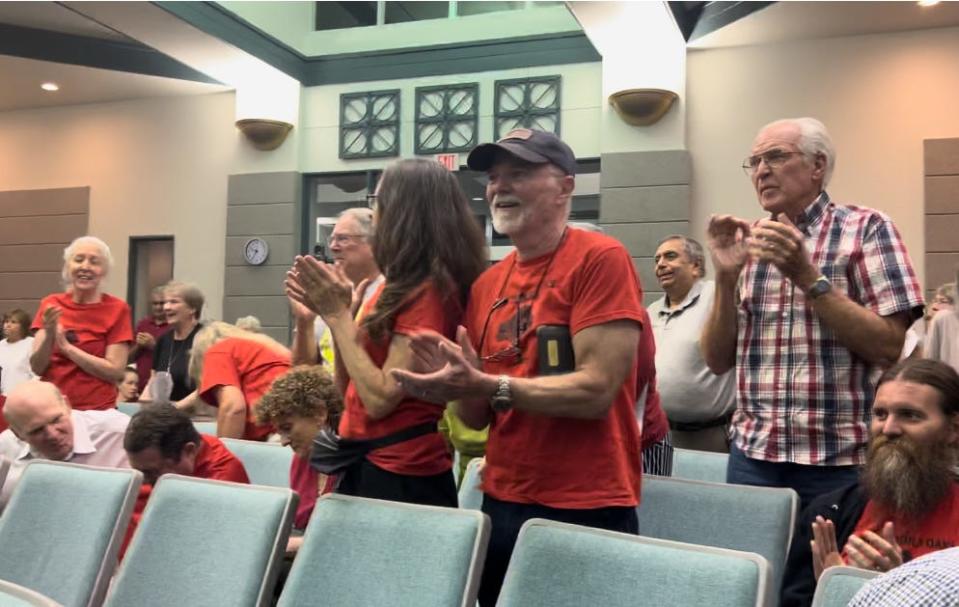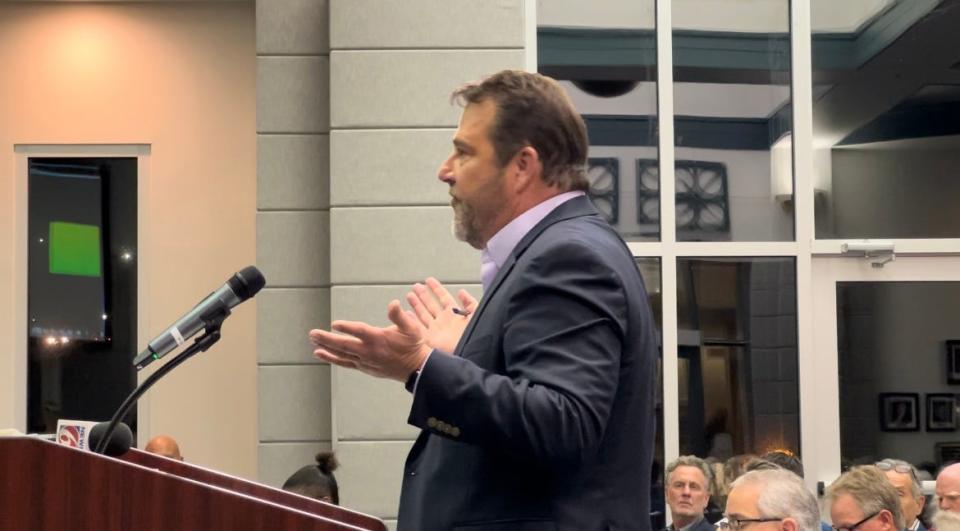Tomoka Reserve developers seek mediator to settle dispute with Ormond. Here's why.
An attorney representing developers seeking to turn the former Tomoka Oaks golf course into homes warned Ormond Beach City Commissioners last month that his clients were prepared to sue if their rezone request was denied.
The commissioners voted 5-0 to reject the application anyway.
Instead of immediately filing the "$40 million damages claim" that attorney Karl Sanders alluded to, his clients are now asking a mediator to step in.
"The primary objective ... is to facilitate a speedy resolution of local land use/zoning disputes by having the Special Magistrate serve as a mediator," Sanders confirmed in an email to The Daytona Beach News-Journal.
As of Wednesday, a mediator had yet to be selected.
"The city remains committed to considering reasonable solutions," wrote Ormond Beach City Attorney Randy Hayes in an email. "The developers' attorney has suggested some names, but I'm not aware that an appointment (of a mediator) has been made."

What's the dispute about?
The developers ― Ormond Beach restaurateur Ray Barshay, local Realtor Carl Velie and South Florida real estate investor Sheldon Rubin ― paid $2.6 million to acquire the former Tomoka Oaks golf course in 2021.
Their aim: redevelop the 147.9-acre property into a new gated community called Tomoka Reserve.
What makes the project controversial?
Unlike most new residential subdivisions that are standalone, Tomoka Reserve would be entirely surrounded by an existing non-gated community called Tomoka Oaks.
Some of the 547 homes at Tomoka Oaks date back to the early 1960s when the 18-hole course, known originally as the Sam Sneed Golf & Country Club, opened.
The golf course ceased operation in 2018. The land remains undeveloped green space.
Tomoka Oaks includes homes whose backyards abut the former golf course. The owners of those homes said they paid extra for that privilege.
The loss of the green space is just one of the complaints raised by Tomoka Oaks residents in opposing the Tomoka Reserve project.
Other concerns include the number of proposed homes which they say are too many, the incompatibility of new more uniform-looking homes being built next to Tomoka Oaks' older, eclectic mix of homes, and increased traffic congestion.
Then there's the issue over how Tomoka Reserve residents would enter and leave the new gated community.
Under the proposal presented last year, Tomoka Reserve would only have a single entrance/exit along Tomoka Oaks Boulevard.
The narrow two-lane road also serves as the main entrance for both the Tomoka Oaks community as well as an adjoining condominium community called Escondido at Tomoka.
Efforts to appease neighbors failed to win support

After holding several "developer-initiated" neighborhood meetings to hear area residents' concerns, the developers presented plans to the city last year. The "Planned Residential Development" proposal called for 276 single-family homes surrounded by a 50-foot-wide "natural landscape" perimeter buffer.
The Ormond Beach Planning Board reviewed the plans over three lengthy meetings that went late into the night in July, August and September.
During that process, the developers reduced the number of proposed homes to 272.
Despite that change, the Planning Board in September voted unanimously to recommend that the City Commission reject the so-called PRD plan.
The City Commission in November remanded the project back to the Planning Board with admonitions to the developers to significantly reduce the number of homes.
The developers responded by withdrawing their PRD proposal in favor of seeking R-2 zoning that would allow them to develop more homes while only providing a six-foot-wide perimeter buffer.
What is R-2 zoning?
R-2 is short for "Residential-2 low density single-family residential." In theory, it allows up to 4.3 residential units per acre.
In the case of the irregularly shaped former Tomoka Oaks golf course, the actual maximum number of homes that could be developed would be just slightly over 300 because of the requirements for each lot to include setbacks.
The developers said they were seeking R-2 zoning because that is the zoning for both the Tomoka Oaks community as well as several neighboring communities.
At one time, the golf course was also zoned R-2.
Zoning for the property was changed to PRD in 2006. That's when the City Commission approved plans by the golf course's then-owner to develop 119 townhomes and condo units as well as three single-family homes in the center of the property. That plan would have retained the golf course.
The homes, townhomes and condos were never built. The project was shelved because of the onset of the Great Recession. The PRD agreement with the city expired in 2014.
Is it currently zoned for anything? City, developers disagree
Triumph Oaks partners contend the lack of a new PRD agreement means the property is not currently zoned for any use.
The city disagrees. In an Order of Denial document filed after the R-2 zoning request was rejected, the city stated that the property remains zoned PRD.
Several City Commissioners at the April 16 meeting urged the developers to come up with a new PRD proposal that could address the concerns raised by area residents and city planning staff. However, a new PRD would require approval from both the City Commission and developers. The City Commission is not likely to approve any such agreement unless it gets support from area residents.
"The City Commission determined that the Property could be developed under PRD zoning upon a resolution of issues including the number of lots, lot sizes, buffer, and traffic impacts. It remanded the matter to the Planning Board for additional consideration and resolution of the stated issues," the Order of Denial document stated.
Sanders at the April 16 meeting told the commissioners prior to their vote that the lack of a development order for the former golf course was illegal.
"You have to have documented property rights, period," Sanders said. Even though the former golf course is shown on city documents as zoned PRD, that designation is simply a meaningless color on a map unless it is accompanied by a development order, he added.
'Final opportunity to engage in meaningful negotiations'

In an email to The News-Journal, Sanders explained why his clients are now seeking help from a mediator.
"The ownership group heard the public comments of several Commissioners (on April 16) and have decided to present the city with an opportunity to have meaningful settlement discussions," Sanders wrote.
In a letter to Ormond Beach Mayor Bill Partington dated April 25, Sanders wrote that his clients "decided to provide the city with one final opportunity to engage in meaningful negotiations with Triumph Oaks."
Sanders ruled out the possibility of reopening the golf course as some Tomoka Oaks residents have advocated. "The old golf course was abandoned years ago, and it is not coming back," he wrote Partington.
Sanders added that his clients' offer to try to reach a mediated solution is not out of fear they might lose in court.
"To be clear, we did not invoke this process because of any concerns about either the strength of our legal position or our odds of prevailing in court," Sanders wrote.
"This case ... implicates very specific constitutional rights that, when violated, expose the city to actual liability for payment of the attorneys' fees incurred by the property owner," Sanders wrote. "The city also has significant legal exposure to liability for payment of monetary damages as compensation for an unlawful taking of one's private property rights."
HOA reacts to developers' latest move
Jim Rose is a Tomoka Oaks resident who chairs the golf course committee for the community's voluntary homeowners association.
"Yes, we are aware of the special magistrate demand," Rose told The News-Journal. "We had anticipated the filing. We are reviewing the documents and will be commenting further after analyzing the pleadings. We remain confident in our legal position."
This article originally appeared on The Daytona Beach News-Journal: Tomoka Reserve developers hope mediator can resolve dispute with Ormond
